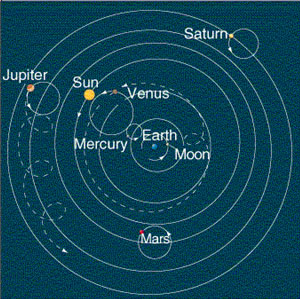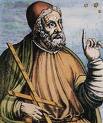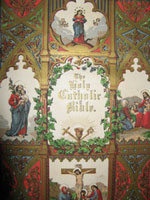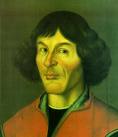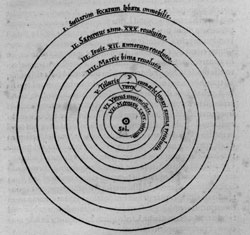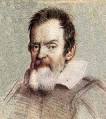TABLE OF CONTENTS for BRITISH LITERATURE
TABLE OF CONTENTS for SHAKESPEARE
ASTRONOMY AND THE BIBLE
The players and the field....
Who is Who (or whom?), and what is what?
(click here for a useful link-Gene Smith's History of Astronomy
from the University of California)
THE BIBLE SEEMED TO OFFER A VIEW OF THE MACROCOSM THAT THE "NEW SCIENCE" CONTRADICTED:
JOSHUA PRAYED TO THE LORD, AND SAID IN THE PRESENCE OF ISRAEL... "STAND STILL, O SUN,...O MOON...AND THE SUN STOOD STILL AND THE MOON STAYED, WHILE THE NATION TOOK VENGEANCE ON ITS FOES."
THE LORD IS KING IN SPLENDOR ROBED...AND HE HAS MADE THE WORLD FIRM, NOT TO BE MOVED
GOD FIXED THE EARTH ON ITS FOUNDATION NOT TO BE MOVED FOREVER.
THE SUN RISES AND THE SUN GOES DOWN...HE HAS PITCHED A TENT THERE FOR THE SUN, WHICH COMES FORTH LIKE THE GROOM FROM HIS BRIDAL CHAMBER, AND LIKE A GIANT, JOYFULLY RUNS ITS COURSE.
GOD SET THEM [THE SUN AND THE MOON] IN THE DOME OF THE SKY TO SHED LIGHT...
THE GREEK PERSPECTIVE SEEMED TO AGREE WITH GENESIS:ARISTOTLE ON PLANETARY MOTION SAID:
LET US FIRST DECIDE THE QUESTION WHETHER THE EARTH MOVES OR IS AT REST. THE OBSERVED FACTS ABOUT THE EARTH ARE...THAT IT REMAINS AT THE CENTER [OF THE UNIVERSE]. THE ORDER OF THE UNIVERSE IS ETERNAL. IT IS CLEAR THAT THE EARTH MUST BE AT THE CENTER AND IMMOVABLE BECAUSE HEAVY BODIES FORCIBLY THROWN QUITE STRAIGHT UPWARD RETURN TO THE POINT FORM WHICH THEY STARTED, EVEN IF THEY ARE THROWN TO AN INFINITE DISTANCE...
THERE IS SOMETHING WHICH IS ALWAYS IN MOTION WITH A CEASELESS CIRCULAR MOVEMENT, AND THIS IS PLAIN NOT ONLY TO REASON, BUT ALSO IN FACT...NO CHANGE WHATSOEVER APPEARS TO HAVE TAKEN PLACE EITHER IN THE WHOLE OF THE OUTERMOST HEAVEN OR IN ANY OF ITS PROPER PARTS...SINCE MOTION MUST ALWAYS EXIST AND MUST NOT CEASE, THERE MUST NECESSARILY BE SOMETHING THAT FIRST INITIATES MOTION AND THIS FIRST MOVER MUST BE UNMOVED ON SUCH A PRINCIPLE THEN THE HEAVENS AND NATURE DEPEND. AND ITS LIFE IS LIKE THE BEST WE HAVE FOR A SHORT TIME. AND THINKING IN ITSELF IS CONCERNED WITH THAT WHICH IS BEST IN ITSELF...IF THEN GOD [IN THE PRE-CHRISTIAN SENSE AS PURE ACT AND NO POTENTIAL.] IS ALWAYS IN THAT GOOD STATE IN WHICH WE ARE SOMETIMES, THIS IS WONDERFUL. AND LIFE ALSO BELONGS TO HIM. FOR THE ACTUALITY OF REASON IS LIFE...WE HOLD THEN THAT GOD IS A LIVING BEING, ETERNAL AND MOST GOOD, AND SO LIFE AND CONTINUOUS AND ETERNAL DURATION BELONGS TO GOD. FOR THIS IS GOD.
[DR. NIGHAN'S NOTE: THIS MOVER IS THE FINAL CAUSE OF ALL MOTION. THE PRIME MOVER, UNCAUSED CAUSE FIT NICELY OR SO IT APPEARED WITH THE MEDIEVAL IDEA OF GOD. [RECALL WE SAID THERE WERE SERIOUS DIFFERENCES TOO]. NOTE THE BLENDING OF THEOLOGY AND SCIENCE . WHAT IS SOMETIMES OVERLOOKED IS THAT ARISTOTLE HIMSELF SAID HE WAS UNSURE OF SOME OF THE ELEMENTS OF THIS THEORY. THERE ARE SECTIONS OF THE METAPHYSICS OF ARISTOTLE THAT DEAL WITH THE NUMBER OF SPHERES FOR THE PLANETS THAT REVOLVE AROUND THE EARTH. THESE CALCULATIONS ARE BASED ON OBSERVATION AND A STUDY OF ANCIENT SOURCES.]
Click here for an article on Aristotle's Astronomy.
COPERNICUS: ALTHOUGH IN MOST WAYS, COPERNICUS WAS A MEDIEVALIST AND NEVER INTENDED TO CONTRACT THE THEOCENTRIC VIEW, HE NONETHELESS BEGAN TO ADVOCATE DIFFERENCES FROM THE TRADITIONAL VIEWS:
THAT THE EARTH IS NOT THE CENTER OF ALL REVOLUTIONS IS PROVED BY THE APPARENTLY IRREGULAR MOTIONS OF THE PLANETS AND THE VARIATIONS IN THE DISTANCES FROM THE EARTH. THESE WOULD BE UNINTELLIGIBLE IF THEY MOVED IN CIRCLES CONCENTRIC WITH THE EARTH. SINCE, THEREFORE, THERE ARE MORE CENTERS THAN ONE, WE MAY DISCUSS WHETHER THE CENTER OF THE UNIVERSE IS OR IS NOT THE EARTH'S CENTER OF GRAVITY. NOW IS SEEMS TO ME GRAVITY IS BUT A NATURAL INCLINATION BESTOWED ON THE PARTS OF BODIES BY THE CREATOR...IN THE MIDDLE OF ALL SITS THE SUN ENTHRONED...IN THIS MOST BEAUTIFUL TEMPLE COULD WE PLACE THIS LUMINARY IN ANY BETTER POSITION FROM WHICH HE CAN ILLUMINATE THE WHOLE AT ONCE? HE IS RIGHTLY CALLED THE LAMP, THE MIND, THE RULE OF THE UNIVERSE, THE VISIBLE GOD.. SO THE SUN SITS A UPON A ROYAL THRONE RULING HIS CHILDREN THE PLANETS WHICH CIRCLE AROUND HIM.
THE FOLLOWING BY COPERNICUS INDICATES WHY HE WAS RELUCTANT TO PUBLISH HIS FINDINGS...
AS SOON AS SOME PEOPLE LEARN THAT IN THIS BOOK WHICH I HAVE WRITTEN THAT...I ASCRIBE CERTAIN MOTIONS TO THE EARTH, THEY WILL CRY OUT AT ONCE THAT I AND MY THEORY SHOULD BE REJECTED. FOR I AM NOT SO MUCH IN LOVE WITH MY CONCLUSIONS AS NOT TO WEIGH WHAT OTHERS WILL THINK ABOUT THEM, AND ALTHOUGH I KNOW THAT THE MEDITATIONS OF A PHILOSOPHER ARE FAR REMOVED FROM THE JUDGMENT OF THE LAITY, BECAUSE HIS ENDEAVOR IS TO SEEK OUT THE TRUTH IN ALL THINGS, SO FAR AS THIS IS PERMITTED BY GOD TO THE HUMAN REASON, I STILL BELIEVE THAT ONE MUST AVOID THEORIES FOREIGN TO ORTHODOXY. ACCORDINGLY, WHEN I CONSIDERED IN MY OWN MIND HOW TO ABSURD A PERFORMANCE IT MUST SEEM TO THOSE WHO KNOW THAT THE JUDGMENT OF MANY CENTURIES HAS APPROVED THE VIEW THAT THE EARTH REMAINS FIXED AS CENTER IN THE MIDST OF THE HEAVENS, IF I SHOULD ON THE CONTRARY, ASSERT THAT THE EARTH MOVES, I WAS FOR A LONG TIME AT A LOSS TO KNOW WHETHER I SHOULD PUBLISH THE COMMENTARIES WHICH I HAVE WRITTEN IN PROOF OF ITS MOTION...THEREFORE WHEN I CONSIDERED THIS CAREFULLY, THE CONTEMPT WHICH I HAD TO FEAR BECAUSE OF THE NOVELTY AND APPARENT ABSURDITY OF MY VIEW, NEARLY INDUCED ME TO ABANDON UTTERLY THE WORK I HAD BEGUN. MY FRIENDS, HOWEVER, IN SPITE OF LONG DELAY AND EVEN RESISTANCE ON MY PART, WITHHELD ME FROM THIS DECISION
GALILEO IS MOST FREQUENTLY ASSOCIATED WITH THE REVOLUTION THAT ANGERED THE CHURCH, AND HIS HOUSE ARREST IS THE FOCUS OF INQUIRY. HOWEVER, THERE IS MORE TO THAT STORY THAN IS POPULARLY KNOWN AS WE WILL SEE...
NOTE WHAT HE SAYS AND DOES NOT SAY REGARDING GOD...
The reason produced for condemning the opinion that the Earth moves and the sun stands still is that in many places in the Bible one may read that the sun moves and the earth stands still. Since the Bible cannot err, it follows as a necessary consequence that anyone takes an erroneous and heretical position who maintains that the sun is inherently motionless and the earth is movable.
With regard to this argument, I think in the first place that it is very pious to say and prudent to affirm that the holy Bible can never speak untruth--whenever its true meaning is understood. But I believe nobody will deny that it is often very abstruse, and may say things which are quite different from what its bare words signify. Hence in expounding the Bible if one were always to confine oneself to the unadorned grammatical meaning, one might fall into error. Not only contradictions and propositions far from true might thus be made to appear in the Bible, but even grave heresies and follies. Thus it would be necessary to assign to God feet, hands, and eyes, as well as corporeal and human affections, such as anger, repentance, hatred and sometimes even the forgetting of things past and ignorance of those to come. These propositions uttered by the Holy Ghost were set down in that manner by the sacred scribes in order to accommodate them to the capacities of the common people, who are rude and unlearned. For the sake or those who deserve to be separated from the herd, it is necessary that wise expositors should produce the true senses or such passages, together with the special reasons for which they were set down in these words. This doctrine is an widespread and so definite with all theologians that it would be superfluous to adduce evidence for it.

(Galileo's Telescope)
Hence I think that I may reasonably conclude that whenever the Bible has occasion to speak or any physical conclusion, (especially those which are very abstruse and hard to understand), the rule has been observed of avoiding confusion in the minds of the common people which would render them contumacious toward the higher mysteries. Now the Bible, merely to condescend to popular capacity, has not hesitated to obscure some very important pronouncements, attributing to God himself some qualities extremely remote from (and even contrary to) his essence. Who then would positively declare that this principle has been set aside, and that the Bible has confined itself rigorously to bare and restricted sense of its words, when speaking but casually of the earth, of water, of the sun, or of any other created thing? Especially in view of the fact that these things in no way concern the primary purpose of the sacred writings, which is the service of God and the salvation of souls - matters infinitely beyond the comprehension of the common people.
This being granted, I think that in discussions of physical problems, we ought to begin not from the authority of scriptural passages, but from the sense-experiences and necessary demonstrations, for the holy Bible and the phenomena of nature proceed alike from the divine Word, the former as the dictate of the Holy Ghost and the latter as the observant executrix of God's commands. It is necessary for the Bible in order to accommodated to the understanding of every man, to speak many things which appear to differ from the absolute truth so far as the bare meaning of the words is concerned. but nature on the other had is inexorable and immutable; she never transgresses the laws imposed upon her, or cares a whit whether her abstruse reasons and methods of operation are understandable to men. For that reason it appears that nothing physical which sense-experiences sets before our eyes, or which necessary demonstrations prove to use, ought to be called in question (much less condemned) upon the testimony of biblical passages.
"We conclude that God is known first Nature and then again, more particularly, by doctrine, by Nature in His works, and by doctrine in his revealed word."
From this I do not mean to infer that we need not have an extraordinary esteem for the passages of holy Scripture. On the contrary, having arrived at any certainties in physics, we ought to utilize these as the most appropriate aids in the true exposition of the Bible and in the investigation of those meanings which are necessarily contained therein, for these must be concordant with demonstrated truths. I should judge that the authority of the Bible was designed to persuade men of those articles and propositions which, surpassing all human reasoning, could not be made credible by science, or by any other means than through the very mouth of the Holy Spirit.
Yet even in those propositions which are not matters of faith, this authority ought to be preferred over that of all human writings which are supported only by bare assertions or probable arguments, and not set forth in a demonstrative way. This I hold to be necessary and proper to the same extent that divine wisdom surpasses all human judgment and conjecture. But I do not feel obliged to believe that the same God who has endowed use with senses, reason and intellect has intended to forgo their use and by some other means to give us knowledge which we can attain by them.
NOTES:
WHAT CAN YOU CONCLUDE REGARDING THE ABOVE INFORMATION RELATING TO THE SCIENTIFIC METHOD, ASTRONOMY AND THE CHANGE IN THE CLASSICAL / MEDIEVAL WORLD VIEW?:
1. Since philosophers of science such as Bacon advocated epistemological changes based on observation of reality (scientifically defined noministically), then sooner or later, Aristotle would have to be questioned. Copernicus helped to initiate this questioning.
2. Copernicus did not advocate a split from the church, but nonetheless, his views pointed the way to what change?
3. Since the Church of course accepted the Bible as the literal word of God, and Aristotle's cosmology reinforced such beliefs, any questioning of Aristotle would in turn appear to contravene dogma and therefore be suspect.
4.The church, though, initially accepted the new astronomy. Why?
5. When Galileo as the founder of modern physics and observational astronomy proved what we have discussed above, what were the consequences for...
A. the chain of being
B. the relationship between the macrocosm and the microcosm
C. the size of the universe
AN IN DEPTH STUDY OF THE FAITH vs. SCIENCE
CONTROVERSY IS EXPLICATED by RICHARD E.
RUBENSTEIN: ARISTOTLE'S CHILDREN
HARCOURT BOOKS, 2003.
Chapter VIII provides a thought-provoking summary of the text enriched with contemporary examples that deconstruct predispositions many hold regarding his topic. Some excerpts follow...
1. "What is mythical is the idea that faith and reason have always been implacable enemies--an idea that implies that any other relationship between them is impossible." (p. 273)
2. In the 1300's Bishop Buridan demonstrated that Aristotle's belief that two types of motion existed was open to question. Oresme postulated that the earth did not remain fixed in the sky, quite an argument from a bishop as such protocols tended to contradict a literal read of Sacred Scripture. Ironically, Aristotle was used to deconstruct Aristotle, p. 279. {Instructor's note: Aristotle must have learned much about Socratic irony...why was The Republic written?}
3. Rubenstein argues that, "...a sovereign God who gives his creation both meaning and autonomy--provided fertile soil for the development of new scientific and religious ideas." (p. 280)
4. I worked with a science teacher who argued, somewhat with tongue and cheek but somewhat seriously that "Aristotle was a bum," meaning he set back scientific thought centuries. Rubenstein addresses the question: "What accounts", he wonders, "for this ferocious hostility?" (p. 285)
5. Rubenstein suggests that historically, the Medieval ethic of Aristotelian Christianity was an obstacle to the secularists whose ethic of economic exploitation could not expand. (p. 286). Luther epitomized the anti-Aristotelian bias. As a consequence, he believes such a bias generated subjective textual interpretations of the Bible that separated a now required scientific analysis from "subjectivist religion." (p. 289). Aristotle thus became discredited as his ideas were associated with a Catholicism that seemed to retard the very scientific progress secularists wanted. (Instructor's note: See Chapter VII which discusses Ockham's Razor.) The schism between science and faith widened to this day.
6. Rubenstein believes the increasing importance of a globalist perspective in our own era requires more and more an Aristotelian perspective. Ironically today science has become what faith once was: an absolute with "a God of the gaps" (p. 292) filling in what science cannot yet explain. Essentially with such examples as cloning, gay rights, abortion on the front page, perhaps the survival of our world depends on a philosophical perspective that defines the relationship between what is and what ought to be. {Instructor's note: Readers of Frankenstein and Dracula well understand what is at stake).
As expected Shakespeare embraced both perspectives, chiefly in Hamlet. If Bloom is correct and Hamlet's vast intelligence mimes his creator, then the Prince thinks inductively and deductively--embracing and synthesizing faith and science. His acute powers of observation suggest induction as he knows for example that art holds a mirror up to nature, that Polonius forbids Ophelia to pursue a romantic relationship, and evidence exists for a good / bad ghost. His use of the word OR so many times: be thou a spirit of health or goblin damned, to be or not to be, etc. dramatizes that he embraces dialectical thinking and deduces behaviour objectives from what he inductively observes. Perhaps the best instance of combining both views occurs in his letter to Ophelia in II,ii:
'Doubt thou the stars are fire;
Doubt that the sun doth move;
Doubt truth to be a liar;
But never doubt I love.
'O dear Ophelia, I am ill at these numbers; I have not art to
reckon my groans; but that I love thee best, O most best, believe
it. Adieu.
'Thine evermore, most dear lady, whilst this machine is to him,
HAMLET.
Here we find Bacon, Galileo, romance, love, passion, angst, and perhaps Descartes all synthesized.
TABLE OF CONTENTS

